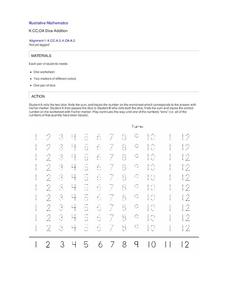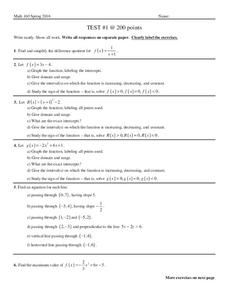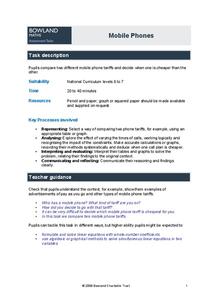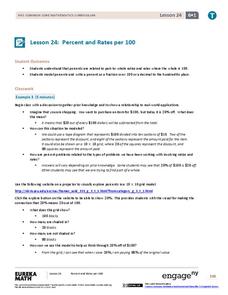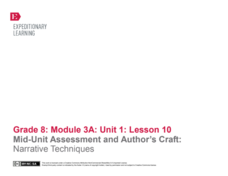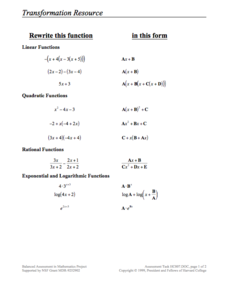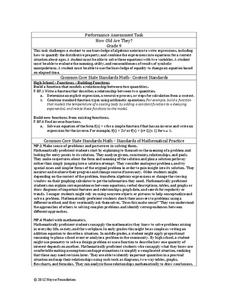Fluence Learning
Writing About Informational Text: Music and the Brain
Even if you've never picked up a musical instrument, chances are that music has directly impacted your mental and emotional development. Sixth graders engage in a reading activity in which they read two articles on the impact of music on...
Balanced Assessment
Cost of Living
Math scholars investigate the cost of living in Hong Kong compared to Chicago but must first convert the different types of currency. They then choose a type of graph to compare different spending categories and finish the activity by...
Mathematics Assessment Project
Sorting Functions
There's no sorting hat here. A high school assessment task prompts learners to analyze different types of functions. They investigate graphs, equations, tables, and verbal rules for four different functions.
Achieve
Ground Beef
Ever wonder how a butcher creates the different types of ground beef? Young mathematicians explore the methods butchers use to create their desired ground beef quality. Given a combination of two types of meat with varying...
Concord Consortium
Betweenness IV
Challenge your classes to think between the curves. Given two function formed by the combination of two exponential functions, individuals must write three functions in which all values would lie between the given. The question is...
Balanced Assessment
Vacation in Bramilia
This performance task gives the population model of different types of flies and asks scholars to analyze the two populations. After interpreting the functions individually, participants compare the two populations and find the time...
Illustrative Mathematics
Alike or Different Game
How are a circle and triangle alike? How are they different? These are the types of questions children will answer while playing this fun geometry game. Including a variety of conventional and unconventional shapes, this activity allows...
Mt. San Antonio Collage
Quiz 1: Types of Functions
Sometimes the best things are already done for you! Here is a six-problem quiz that has a variety of problems ranging from solving quadratic equations to interpreting a function. The piece-de-resistance is the worked out answer key in...
College Board
2016 AP® English Language and Composition Free-Response Questions
When it comes to testing, practice makes perfect. A set of free-response questions from the AP® English Language and Composition exam help writers prepare for the test. Three different prompts cover topics such as monolingual English...
Curated OER
Dice Addition
Using the provided tracing number worksheet, a pair of kindergartners will practice their adding skills. Player A will roll two die, add the sum, and then trace the sum on the worksheet. Player B will take a turn and do the same. The...
Concord Consortium
Crossing the Axis
Mathematicians typically reference eight different types of functions. Scholars learn about the requirements for graphing a function and must decide how many different functions fit. To finish, they define each specific function meeting...
Mt. San Antonio Collage
Test 1: Graphing Functions
Graph the night away with all the different types of functions provided in the worksheet. Linear, quadratic, and rational all ask for graphs, domain and range and other key factors about the functions.
EngageNY
Solving Problems by Finding Equivalent Ratios
Combine total quantities and equivalent ratios in problem solving. The fifth lesson in a series of 29 presents problems that can be solved using equivalent ratios. Pupils use part-to-part ratios and either sums or differences of the...
Bowland
Mobile Phones
Cheaper cell phone bills? Learners compare two different cell phone plans for a specified number of minutes of phone usage each day. They also determine the conditions for which one plan is cheaper than the other.
College Board
2004 AP® English Language and Composition Free-Response Questions
Shall we agree to disagree? Scholars have the opportunity to choose a topic they feel is controversial in the world and express ideas about it. They complete essays that address the opposite views. In two other essays, they analyze a...
EngageNY
Percent and Rates per 100
What percentage of your class understands percents? Pupils learn the meaning of percents based upon rates per 100 in the 24th lesson in a series of 29. They represent percents as fractions, decimals, ratios, and models. The scholars...
George W. Bush Presidential Library and Museum
Teaching Primary and Secondary Sources
What makes a source primary or secondary? Middle schoolers read a definition of each term before exploring different examples and applying their knowledge to a research project.
Concord Consortium
School Bus Routes
Plan the way to school. Given a map of a school district, class members portray a transportation consultant hired to develop a bus transportation plan that will pick up the eligible riders and get them to school. The plan must contain...
EngageNY
Mid-Unit Assessment and Author’s Craft: Narrative Techniques
Scholars work together to compile a list of things good writers do to perfect their craft and write the ideas on a whiteboard. They then discuss the differences between passive and active sentences and use their knowledge to identify...
Concord Consortium
Transformations Resource
Transform your lesson for transforming functions. Scholars transform linear, quadratic, exponential, rational, and trigonometric expressions. They write their expressions to fit specific forms and identify the values of the resulting...
New York State Education Department
US History and Government Examination: August 2016
Multiple-choice and essay questions test comprehension, writing ability, and skills with primary source analysis. The comprehensive exam covers many different subjects including the United States census, Constitution, and important...
Inside Mathematics
How Old Are They?
Here is a (great) lesson on using parentheses! The task requires the expression of ages using algebraic expressions, including the distributive property. Pupils use their expressions to determine the individual ages.
Curated OER
Mixing Candies
Mixture problems are a classic in first-year algebra. Unfortunately, many learners approach them in a formulaic fashion and don't truly understand the meaning of the algebraic expressions they are using. Here, the questions are not the...
Curated OER
More and Less Handfuls
Working as a pair, two kindergartners will sit at a table and will pick two handfuls of counters. They will combine their individual handfuls into one, and count their own selection. They will then draw and record their count on a record...









